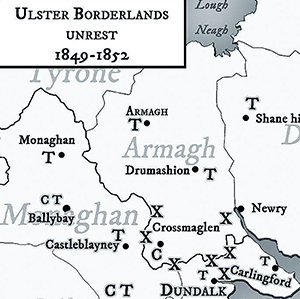June 8
Published in On this Day listing 1876 James McKnight (75), journalist and agrarian reformer, died. McKnight came to national prominence in 1847 as spokesman for the thousands of Presbyterian tenant farmers who flocked to join the Ulster Tenant Right League, which sought to give legal protection to the Ulster Custom. Regarded at the time as the leading Presbyterian layman, it was he who was chiefly responsible for focusing the aims of the League on the extension of the Ulster Custom to the whole island—the ‘three Fs’: fair rent, free sale and fixity of tenure, meaning no eviction if rent had been paid. This programme was to guide the Irish land reform movement for the next 30 years. His lifelong passion, however, was in the cultural field, as an Irish-speaker who promoted the preservation and publication of ancient Irish manuscripts. Born near Rathfriland, Co. Down, he initially intended to become a Presbyterian minister before turning to journalism and becoming editor of the Belfast News Letter (1829–46). In the columns of that paper, he continually highlighted the common origins of the Irish and Scots Gaelic languages and, by implication, the shared culture of Irish Catholics and their Presbyterian neighbours. As a committed unionist, albeit a liberal one, he was sharply critical of the nationalist politics of Daniel O’Connell. The Repeal campaign, for instance, he described as divisive, suggesting that patriotic sentiment would be better served by reviving and promoting the Irish language. His enthusiasm for the language never waned. On his deathbed, the story goes, he asked his servant, a Catholic, to recite for him the Lord’s Prayer in Irish. She did as he requested, but at one point was interrupted by the dying McKnight, who pointed out that she had mispronounced one of the words.
1876 James McKnight (75), journalist and agrarian reformer, died. McKnight came to national prominence in 1847 as spokesman for the thousands of Presbyterian tenant farmers who flocked to join the Ulster Tenant Right League, which sought to give legal protection to the Ulster Custom. Regarded at the time as the leading Presbyterian layman, it was he who was chiefly responsible for focusing the aims of the League on the extension of the Ulster Custom to the whole island—the ‘three Fs’: fair rent, free sale and fixity of tenure, meaning no eviction if rent had been paid. This programme was to guide the Irish land reform movement for the next 30 years. His lifelong passion, however, was in the cultural field, as an Irish-speaker who promoted the preservation and publication of ancient Irish manuscripts. Born near Rathfriland, Co. Down, he initially intended to become a Presbyterian minister before turning to journalism and becoming editor of the Belfast News Letter (1829–46). In the columns of that paper, he continually highlighted the common origins of the Irish and Scots Gaelic languages and, by implication, the shared culture of Irish Catholics and their Presbyterian neighbours. As a committed unionist, albeit a liberal one, he was sharply critical of the nationalist politics of Daniel O’Connell. The Repeal campaign, for instance, he described as divisive, suggesting that patriotic sentiment would be better served by reviving and promoting the Irish language. His enthusiasm for the language never waned. On his deathbed, the story goes, he asked his servant, a Catholic, to recite for him the Lord’s Prayer in Irish. She did as he requested, but at one point was interrupted by the dying McKnight, who pointed out that she had mispronounced one of the words.- 1972 Garda Inspector Sam Donegan (61) was fatally injured by a gelignite bomb reportedly left by the Provisional IRA on the Cavan–Fermanagh border.
- 1949 George Orwell’s Nineteen-eighty-four, mostly written on the Scottish island of Jura when he was seriously ill with tuberculosis, was published.
- 1859 The first edition of the Irish Times as a daily newspaper was published.
- 1917 The Butte, Montana, mine disaster: 168 died, including many Irish, when fire broke out in a mineshaft. Butte was the US’s foremost mining town at the time, with a population of 50,000, a quarter of whom were Irish, mostly from County Cork.
'
















